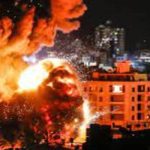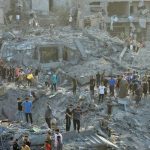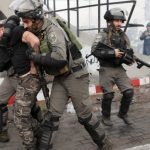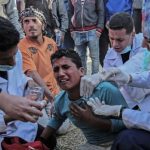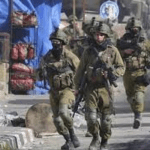More than 100 Palestinians have been killed in air strikes in southern Gaza, officials say, as the Israeli military continues to target the area despite ordering civilians to shelter there.
Most of the dead reportedly fled their homes in the north ahead of what is expected to be a major ground offensive against the militant group Hamas.
The military said it struck a series of Hamas targets in the south.
There is also mounting concern about humanitarian conditions in Gaza.
The US said it had agreed to develop a plan with Israel that would enable aid to reach civilians in the Hamas-governed territory, as UN aid agencies warned that hospitals’ fuel supplies were unlikely to last more than 24 hours, water was extremely limited and shops only had a few days of food left.
There have been hopes of opening Egypt’s Rafah crossing to let lorryloads of urgently needed aid in and Palestinians with foreign passports out. But an Israeli strike reportedly damaged a building at the crossing on Monday.
Israel cut electricity and most water and stopped deliveries of food and medicine through its crossings in response to an unprecedented cross-border attack by Hamas militants on 7 October in which at least 1,300 people were killed and 199 others taken hostage.
More than 2,800 people have been killed in Israel’s bombardment of Gaza since then, according to health officials.
The BBC’s Rushdi Abu Alouf in Khan Younis says that what happened overnight in southern Gaza is very worrying for the hundreds of thousands of people who have complied with last Friday’s order from the Israeli military to evacuate northern Gaza for their “own safety”.
Local officials in Khan Younis said three Israeli air strikes left more than 100 people dead, most of whom were displaced.
Amin Hneideq said his daughter was wounded by a bomb that destroyed a nearby home and killed a family who had fled southwards. “They brought them from the north just to strike them in the south,” he told Reuters news agency.
The Israeli military said on Tuesday morning that it had struck operational command centres, military infrastructure with operatives inside, and hideouts belonging to Hamas in Khan Younis and Rafah, to the south, as well as the northern areas of Zeitoun and Jabalia.
More than 100 Palestinians have been killed in air strikes in southern Gaza, officials say, as the Israeli military continues to target the area despite ordering civilians to shelter there.
Most of the dead reportedly fled their homes in the north ahead of what is expected to be a major ground offensive against the militant group Hamas.
The military said it struck a series of Hamas targets in the south.
There is also mounting concern about humanitarian conditions in Gaza.
The US said it had agreed to develop a plan with Israel that would enable aid to reach civilians in the Hamas-governed territory, as UN aid agencies warned that hospitals’ fuel supplies were unlikely to last more than 24 hours, water was extremely limited and shops only had a few days of food left.
There have been hopes of opening Egypt’s Rafah crossing to let lorryloads of urgently needed aid in and Palestinians with foreign passports out. But an Israeli strike reportedly damaged a building at the crossing on Monday.
Israel cut electricity and most water and stopped deliveries of food and medicine through its crossings in response to an unprecedented cross-border attack by Hamas militants on 7 October in which at least 1,300 people were killed and 199 others taken hostage.
More than 2,800 people have been killed in Israel’s bombardment of Gaza since then, according to health officials.
The BBC’s Rushdi Abu Alouf in Khan Younis says that what happened overnight in southern Gaza is very worrying for the hundreds of thousands of people who have complied with last Friday’s order from the Israeli military to evacuate northern Gaza for their “own safety”.
Local officials in Khan Younis said three Israeli air strikes left more than 100 people dead, most of whom were displaced.
Amin Hneideq said his daughter was wounded by a bomb that destroyed a nearby home and killed a family who had fled southwards. “They brought them from the north just to strike them in the south,” he told Reuters news agency.
The Israeli military said on Tuesday morning that it had struck operational command centres, military infrastructure with operatives inside, and hideouts belonging to Hamas in Khan Younis and Rafah, to the south, as well as the northern areas of Zeitoun and Jabalia.
More than 100 Palestinians have been killed in air strikes in southern Gaza, officials say, as the Israeli military continues to target the area despite ordering civilians to shelter there.
Most of the dead reportedly fled their homes in the north ahead of what is expected to be a major ground offensive against the militant group Hamas.
The military said it struck a series of Hamas targets in the south.
There is also mounting concern about humanitarian conditions in Gaza.
The US said it had agreed to develop a plan with Israel that would enable aid to reach civilians in the Hamas-governed territory, as UN aid agencies warned that hospitals’ fuel supplies were unlikely to last more than 24 hours, water was extremely limited and shops only had a few days of food left.
There have been hopes of opening Egypt’s Rafah crossing to let lorryloads of urgently needed aid in and Palestinians with foreign passports out. But an Israeli strike reportedly damaged a building at the crossing on Monday.
Israel cut electricity and most water and stopped deliveries of food and medicine through its crossings in response to an unprecedented cross-border attack by Hamas militants on 7 October in which at least 1,300 people were killed and 199 others taken hostage.
More than 2,800 people have been killed in Israel’s bombardment of Gaza since then, according to health officials.
The BBC’s Rushdi Abu Alouf in Khan Younis says that what happened overnight in southern Gaza is very worrying for the hundreds of thousands of people who have complied with last Friday’s order from the Israeli military to evacuate northern Gaza for their “own safety”.
Local officials in Khan Younis said three Israeli air strikes left more than 100 people dead, most of whom were displaced.
Amin Hneideq said his daughter was wounded by a bomb that destroyed a nearby home and killed a family who had fled southwards. “They brought them from the north just to strike them in the south,” he told Reuters news agency.
The Israeli military said on Tuesday morning that it had struck operational command centres, military infrastructure with operatives inside, and hideouts belonging to Hamas in Khan Younis and Rafah, to the south, as well as the northern areas of Zeitoun and Jabalia.
More than 100 Palestinians have been killed in air strikes in southern Gaza, officials say, as the Israeli military continues to target the area despite ordering civilians to shelter there.
Most of the dead reportedly fled their homes in the north ahead of what is expected to be a major ground offensive against the militant group Hamas.
The military said it struck a series of Hamas targets in the south.
There is also mounting concern about humanitarian conditions in Gaza.
The US said it had agreed to develop a plan with Israel that would enable aid to reach civilians in the Hamas-governed territory, as UN aid agencies warned that hospitals’ fuel supplies were unlikely to last more than 24 hours, water was extremely limited and shops only had a few days of food left.
There have been hopes of opening Egypt’s Rafah crossing to let lorryloads of urgently needed aid in and Palestinians with foreign passports out. But an Israeli strike reportedly damaged a building at the crossing on Monday.
Israel cut electricity and most water and stopped deliveries of food and medicine through its crossings in response to an unprecedented cross-border attack by Hamas militants on 7 October in which at least 1,300 people were killed and 199 others taken hostage.
More than 2,800 people have been killed in Israel’s bombardment of Gaza since then, according to health officials.
The BBC’s Rushdi Abu Alouf in Khan Younis says that what happened overnight in southern Gaza is very worrying for the hundreds of thousands of people who have complied with last Friday’s order from the Israeli military to evacuate northern Gaza for their “own safety”.
Local officials in Khan Younis said three Israeli air strikes left more than 100 people dead, most of whom were displaced.
Amin Hneideq said his daughter was wounded by a bomb that destroyed a nearby home and killed a family who had fled southwards. “They brought them from the north just to strike them in the south,” he told Reuters news agency.
The Israeli military said on Tuesday morning that it had struck operational command centres, military infrastructure with operatives inside, and hideouts belonging to Hamas in Khan Younis and Rafah, to the south, as well as the northern areas of Zeitoun and Jabalia.
More than 100 Palestinians have been killed in air strikes in southern Gaza, officials say, as the Israeli military continues to target the area despite ordering civilians to shelter there.
Most of the dead reportedly fled their homes in the north ahead of what is expected to be a major ground offensive against the militant group Hamas.
The military said it struck a series of Hamas targets in the south.
There is also mounting concern about humanitarian conditions in Gaza.
The US said it had agreed to develop a plan with Israel that would enable aid to reach civilians in the Hamas-governed territory, as UN aid agencies warned that hospitals’ fuel supplies were unlikely to last more than 24 hours, water was extremely limited and shops only had a few days of food left.
There have been hopes of opening Egypt’s Rafah crossing to let lorryloads of urgently needed aid in and Palestinians with foreign passports out. But an Israeli strike reportedly damaged a building at the crossing on Monday.
Israel cut electricity and most water and stopped deliveries of food and medicine through its crossings in response to an unprecedented cross-border attack by Hamas militants on 7 October in which at least 1,300 people were killed and 199 others taken hostage.
More than 2,800 people have been killed in Israel’s bombardment of Gaza since then, according to health officials.
The BBC’s Rushdi Abu Alouf in Khan Younis says that what happened overnight in southern Gaza is very worrying for the hundreds of thousands of people who have complied with last Friday’s order from the Israeli military to evacuate northern Gaza for their “own safety”.
Local officials in Khan Younis said three Israeli air strikes left more than 100 people dead, most of whom were displaced.
Amin Hneideq said his daughter was wounded by a bomb that destroyed a nearby home and killed a family who had fled southwards. “They brought them from the north just to strike them in the south,” he told Reuters news agency.
The Israeli military said on Tuesday morning that it had struck operational command centres, military infrastructure with operatives inside, and hideouts belonging to Hamas in Khan Younis and Rafah, to the south, as well as the northern areas of Zeitoun and Jabalia.
More than 100 Palestinians have been killed in air strikes in southern Gaza, officials say, as the Israeli military continues to target the area despite ordering civilians to shelter there.
Most of the dead reportedly fled their homes in the north ahead of what is expected to be a major ground offensive against the militant group Hamas.
The military said it struck a series of Hamas targets in the south.
There is also mounting concern about humanitarian conditions in Gaza.
The US said it had agreed to develop a plan with Israel that would enable aid to reach civilians in the Hamas-governed territory, as UN aid agencies warned that hospitals’ fuel supplies were unlikely to last more than 24 hours, water was extremely limited and shops only had a few days of food left.
There have been hopes of opening Egypt’s Rafah crossing to let lorryloads of urgently needed aid in and Palestinians with foreign passports out. But an Israeli strike reportedly damaged a building at the crossing on Monday.
Israel cut electricity and most water and stopped deliveries of food and medicine through its crossings in response to an unprecedented cross-border attack by Hamas militants on 7 October in which at least 1,300 people were killed and 199 others taken hostage.
More than 2,800 people have been killed in Israel’s bombardment of Gaza since then, according to health officials.
The BBC’s Rushdi Abu Alouf in Khan Younis says that what happened overnight in southern Gaza is very worrying for the hundreds of thousands of people who have complied with last Friday’s order from the Israeli military to evacuate northern Gaza for their “own safety”.
Local officials in Khan Younis said three Israeli air strikes left more than 100 people dead, most of whom were displaced.
Amin Hneideq said his daughter was wounded by a bomb that destroyed a nearby home and killed a family who had fled southwards. “They brought them from the north just to strike them in the south,” he told Reuters news agency.
The Israeli military said on Tuesday morning that it had struck operational command centres, military infrastructure with operatives inside, and hideouts belonging to Hamas in Khan Younis and Rafah, to the south, as well as the northern areas of Zeitoun and Jabalia.
More than 100 Palestinians have been killed in air strikes in southern Gaza, officials say, as the Israeli military continues to target the area despite ordering civilians to shelter there.
Most of the dead reportedly fled their homes in the north ahead of what is expected to be a major ground offensive against the militant group Hamas.
The military said it struck a series of Hamas targets in the south.
There is also mounting concern about humanitarian conditions in Gaza.
The US said it had agreed to develop a plan with Israel that would enable aid to reach civilians in the Hamas-governed territory, as UN aid agencies warned that hospitals’ fuel supplies were unlikely to last more than 24 hours, water was extremely limited and shops only had a few days of food left.
There have been hopes of opening Egypt’s Rafah crossing to let lorryloads of urgently needed aid in and Palestinians with foreign passports out. But an Israeli strike reportedly damaged a building at the crossing on Monday.
Israel cut electricity and most water and stopped deliveries of food and medicine through its crossings in response to an unprecedented cross-border attack by Hamas militants on 7 October in which at least 1,300 people were killed and 199 others taken hostage.
More than 2,800 people have been killed in Israel’s bombardment of Gaza since then, according to health officials.
The BBC’s Rushdi Abu Alouf in Khan Younis says that what happened overnight in southern Gaza is very worrying for the hundreds of thousands of people who have complied with last Friday’s order from the Israeli military to evacuate northern Gaza for their “own safety”.
Local officials in Khan Younis said three Israeli air strikes left more than 100 people dead, most of whom were displaced.
Amin Hneideq said his daughter was wounded by a bomb that destroyed a nearby home and killed a family who had fled southwards. “They brought them from the north just to strike them in the south,” he told Reuters news agency.
The Israeli military said on Tuesday morning that it had struck operational command centres, military infrastructure with operatives inside, and hideouts belonging to Hamas in Khan Younis and Rafah, to the south, as well as the northern areas of Zeitoun and Jabalia.
More than 100 Palestinians have been killed in air strikes in southern Gaza, officials say, as the Israeli military continues to target the area despite ordering civilians to shelter there.
Most of the dead reportedly fled their homes in the north ahead of what is expected to be a major ground offensive against the militant group Hamas.
The military said it struck a series of Hamas targets in the south.
There is also mounting concern about humanitarian conditions in Gaza.
The US said it had agreed to develop a plan with Israel that would enable aid to reach civilians in the Hamas-governed territory, as UN aid agencies warned that hospitals’ fuel supplies were unlikely to last more than 24 hours, water was extremely limited and shops only had a few days of food left.
There have been hopes of opening Egypt’s Rafah crossing to let lorryloads of urgently needed aid in and Palestinians with foreign passports out. But an Israeli strike reportedly damaged a building at the crossing on Monday.
Israel cut electricity and most water and stopped deliveries of food and medicine through its crossings in response to an unprecedented cross-border attack by Hamas militants on 7 October in which at least 1,300 people were killed and 199 others taken hostage.
More than 2,800 people have been killed in Israel’s bombardment of Gaza since then, according to health officials.
The BBC’s Rushdi Abu Alouf in Khan Younis says that what happened overnight in southern Gaza is very worrying for the hundreds of thousands of people who have complied with last Friday’s order from the Israeli military to evacuate northern Gaza for their “own safety”.
Local officials in Khan Younis said three Israeli air strikes left more than 100 people dead, most of whom were displaced.
Amin Hneideq said his daughter was wounded by a bomb that destroyed a nearby home and killed a family who had fled southwards. “They brought them from the north just to strike them in the south,” he told Reuters news agency.
The Israeli military said on Tuesday morning that it had struck operational command centres, military infrastructure with operatives inside, and hideouts belonging to Hamas in Khan Younis and Rafah, to the south, as well as the northern areas of Zeitoun and Jabalia.



